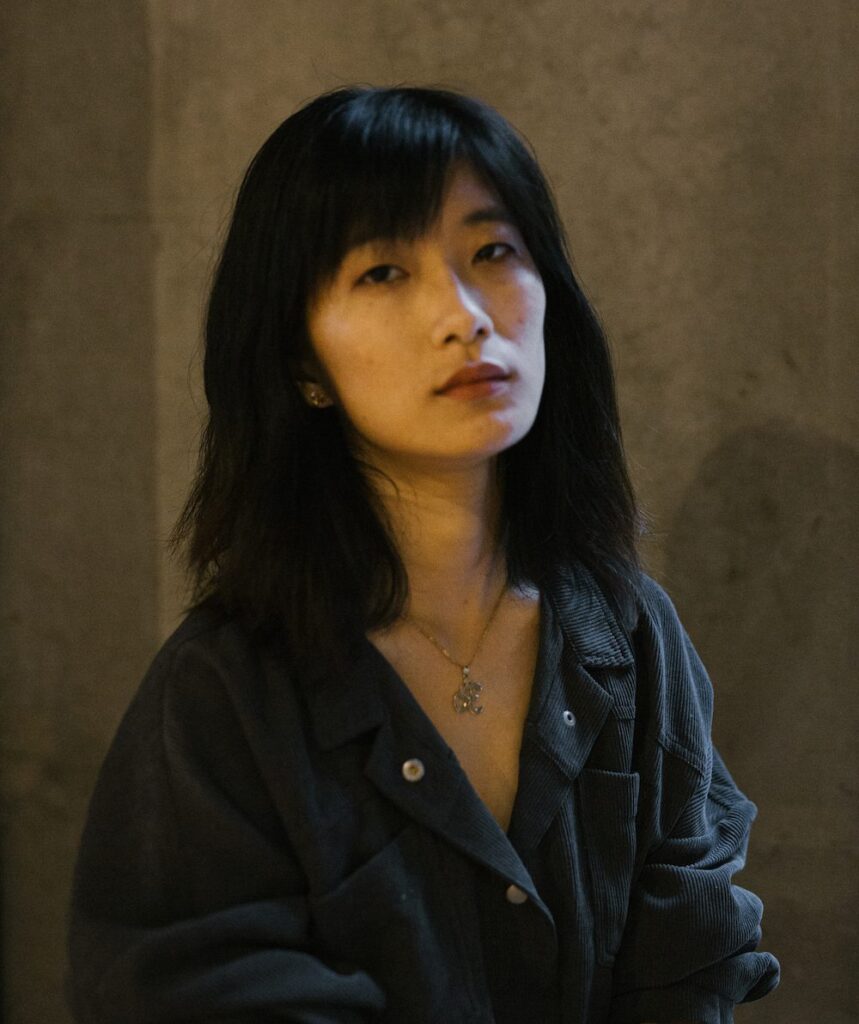Animal, Look
The miracle is not that this
is a lover’s poem, but that I
am the one writing it.
In the bathroom, I perch
at the edge of the tub
while she brushes her teeth
under the light.
Firm line of muscle behind the round shoulder,
stencil sketch of the sharp backbone.
It isn’t that I believed I would never love again,
only,
sometimes, these several years,
I believed I would never love again.
I wrote about deserts, copper,
shorelines and springs.
How the hourglass of life never
is turned.
Now, this woman’s back against my blue
brushed-cotton sheets.
The miracle was not her:
tender, vain, playful,
certain to leave.
Cold edge of the bathtub.
Harsh light of midnight.
It was my own heart I marveled at,
its skip and unease,
How it shifted, a small animal in its nest
raising its head, finally, to look.
“Even though, when I shut my eyes, I still can’t see myself,”
Kerou says at the end of Blue Gate Crossing (2002),
I imagine I might one day meet you, recognizable, wearing the hat I like,
having finally made sense of your history.
The 800 miles I drove upon leaving New York I thought about the word “estrange.”
As a verb, intransitive, in action, passive only. I could be described as estranged
from parents. Time passing. The living. You.
I used to wish I didn’t have a body, and reconciliation seemed a possibility as remote
as a moon landing. I fantasized often about the greater happiness of others.
After my grandmother died, she came back just once, as a spinning leaf. This
was California. I was outside. Her leaf spun for five minutes, improbable,
suspended from a spider’s offering, the color of autumn if it were autumn
somewhere else.
For a long time I talked about myself in the “you” person. You know when you. You know how you. You know, do you. Then I started practicing filling in the blanks:
Yes that did happen. No I was silent. Yes it was hurtful and Yes, I wanted the past to have been a different way. No, you are right, the ocean is marvelous to look at & provides a great sense of infinity and No, in fact, I am nowhere near it.
Yes I feel grief in every pool, every bone.
The past is sometimes like a tattoo, indelible, and sometimes like a receding island.
And the transition from blue to green is so gradual, yet once you see both, there is
no doubt.
The greater distances I enact on myself create an optical illusion, flattening things down to a map’s perspective.
And the question every map asks is what to do with size.
The driver’s mirror is honest about its own distortion.
I look into it trying to recognize myself.
____
Note: The title of this poem references Blue Gate Crossing (2002), directed by Chih-yen Yee, which follows Meng Kerou as she struggles to come to terms with her sexuality and attraction to other women, and her inability to imagine herself in the future. (For more analysis, please refer to Backward Glances: Contemporary Chinese Culture and the Female Homoerotic Imaginary by Fran Martin, Duke University Press, 2010).
On the anniversary of my grandfather’s death in a Hefei hospital
Stove flame to light the pine stick, ashy scent blown
through the window, knees to the ground, I pray.
Grandfather, two years since you are gone,
today, I want to die. And you, whose responsibility
it might have been, have taught me nothing—
not survival, not love, not the distinction between
the past and merely the memory of the living.
Is there a difference?
You walked in the snow out the doorway.
I was a child, left inside. I was a child, waiting
all of my questions unasked: how to entangle two people,
untangle from pain, how to live between the
wheres, whens, & whats of fear—
Your books, I still can’t find them.
For years, when I remembered to, I looked.
Your legacy: an image of a split head
bleeding into a river. I read the interview
in which you shared this, seventy-five years
after the war.
Without you, there would have been no writing.
In lieu of inheritance, you left that.
As for the rest, whether life ought to be tragedy,
farce, romance, or left as uninterpreted memory—
I suppose from where you are now you could tell me.
I suppose from where you are now
you won’t.
CLEO QIAN (she/her) is a writer from California. Her work has been published in or is forthcoming from The Sun, Pleiades, Zocalo Public Square, Four Way Review, the Guardian, and several other outlets. Her first book, LET’S GO LET’S GO LET’S GO, is forthcoming from Tin House in August 2023.
Read more by Cleo Qian
Author’s Website
Poem in Four Way Review
Essay in the Guardian
Poem in Honey Literary
